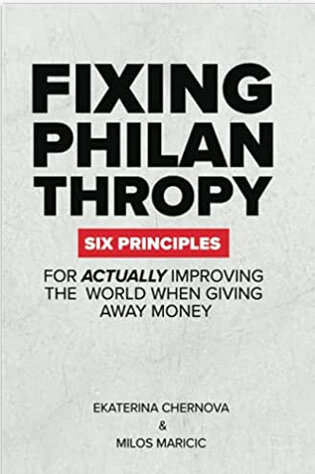Fixing Philanthropy: Six Principles for Actually Improving the World When Giving Away Money
Every so often, I read a book that makes me wonder whether I’m part of the problem. If nothing else, Fixing Philanthropy: Six Principles for Actually Improving the World When Giving Away Money by Ekaterina Chernova and Milos Maricic reminds me that, having been in and around the nonprofit and philanthropic sector for a long time, I risk becoming cynical about whether “doing good” can be done better. For when one is serious about changing the world, it’s not enough to just throw money at a problem; that money may not go where it needs to go, and average donors may not have much of an idea where that is in the first place.
In Fixing Philanthropy, Chernova and Maricic, partners at the Altruist League (AL), present examples of how philanthropy can—indeed, must—make changes to accomplish more for more people or risk becoming obsolete. Moreover, it predicts an upcoming split in the field in which “true financial altruism” becomes the dominant form of philanthropy and leads to more efficient efforts to solve the most significant challenges of our time.
The book, a compilation of essays published on the AL website and various blogs or sent out to members between 2019 and early 2021, presents a theory of change for how philanthropists need to develop theories of change.
In addition to sharing what they wish they had known when they set out on their philanthropic journey years earlier, the authors work to convey a sense of urgency for change in the sector, given the context of a contentious political environment, a global pandemic, protests calling for racial justice and equity, and an insurrection at the U.S. Capitol.
To Chernova and Maricic, the ongoing social tensions are a “crisis of dignity,” and their goal is to close the “dignity gap.” As they see it, the current philanthropic model is incapable of doing so. “[It] has lacked a strategic approach. It has been slow to adopt technical innovation. It remains largely unaccountable to the communities where it works or the broader society,” they write. “Philanthropy sometimes goes hand in hand with tax evasion and malpractice elsewhere in the philanthropist’s portfolio, such as funding fossil fuel companies.”
Written for people with power and wealth—especially the young emerging philanthropists of the 21st century—Fixing Philanthropy proposes six principles for this “New Philanthropy”: a theory of change that fits the world, a proactive focus on systemic problems, trust in new power, intrinsic motivation, alliances, and literacy with new concepts and technologies. But the authors also argue that only two things can change philanthropy for good: the government, with its massive resources, and philanthropists themselves.
Call me cynical, but if you’re waiting for governments amid near-constant political crisis and the world’s wealthiest, most powerful philanthropists to change the status quo to assist the vast majority of billions of people in the world, you’ll soon be disillusioned.
To demonstrate that massive change is possible and can be achieved at revolutionary speed, the authors point to the Black Lives Matter (BLM) movement. Established in 2013 in the turmoil following the acquittal of George Zimmerman in the shooting death of Trayvon Martin, in less than a decade BLM has evolved from a social media hashtag to a national and, ultimately, global movement.
At the same time, the authors’ focus is not on organizations but on philanthropists. While they acknowledge the importance of government in improving philanthropy by using their resources to tackle challenges decisively and making regulatory changes, it is individuals who they believe have the most influence: “It is up to individual funders to reinvent the way they do business, or not. Even seismic global events can only be an inspiration to do something we were planning to do anyway….”
How much of Fixing Philanthropy is fresh perspective and how much is wishful thinking cannot be answered at this point. By design, AL’s index of most effective nonprofits is always in flux. Black Lives Matter sits atop AL’s list of the best activist organization in the world, yet it runs the risk of growing too fast to be effective on the ground. While caught in the crosshairs of conservative media, BLM also is being approached by the corporate world, eager to co-opt its message and water it down. At the same time, according to the authors, BLM needs to define a strategy that influences the opinions of people in the middle of the political spectrum.
The book predicts significant changes in the field of philanthropy in which philanthropy as we know it becomes obsolete and “effective altruism” expands in its wake and helps solve the problems of our time. But “for retail philanthropists as a group to achieve the kind of scale and power enjoyed by the for-profit [investors], it would need two components,” the authors write: technology—i.e., artificial intelligence—and a functioning community. The authors acknowledge that at this time, few if any AI platforms are sufficient to address the needs of individual philanthropic investors at scale. And as for building community, they note that while the philanthropy subreddit on Reddit sees new posts roughly every week, and nonprofits like AL analyze and rank philanthropic investments, the field is nowhere near as vibrant as the for-profit investing field. “And yet it is exactly the community we would need,” they write: one with critical mass.
Moreover, the Effective Altruism movement tends to be hermetic and reliant on a handful of donors, according to the authors, and such groups remain silent on the causes of the world’s most intractable challenges—wealth inequality, race relations, and gender gaps. Finding solutions would require better change models, the authors argue, that take a more mathematical, scientific approach to evaluating how systemic problems are interconnected. Again, the challenge is reaching critical mass.
To someone like me, delivering such drastic change to philanthropic practice around the world seems unlikely at best— at least for the foreseeable future. But as Nelson Mandela reportedly said, “It always seems impossible until it’s done.”
Matt Sinclair is editor of Philanthropy News Digest.










